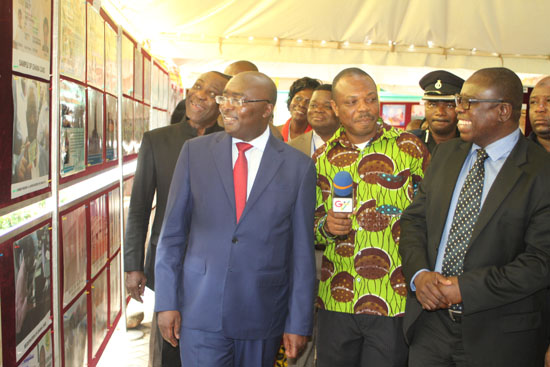The government is to come out with a master plan to facilitate the development of an alternative transportation infrastructure for petroleum products in the country.
The infrastructure, which will include railway pipelines and river barges, will link Ghana with sub-regional markets as well as major demand centres across the country.
It will also deepen the country’s regional integration agenda and fulfil objectives of the African Continental Free Trade Agreement.
The Vice-President, Dr Mahamudu Bawumia, who disclosed this at the opening of the Third Ghana International Petroleum Conference (GhIPCON) in Accra yesterday, said the ministerial committee working on the master plan had since finalised its work which would be presented to Cabinet for consideration.
“For us as a country, our vision for the petroleum downstream industry is to ensure that Ghana becomes a key player in the industry in the West African sub-region,” he said.
According to Dr Bawumia, Ghana’s unique geographical location, coupled with democratic stability and security “requires that we provide leadership in building an integrated infrastructure to serve the sub-regional petroleum industry.”
Organised by the Ministry of Energy and the National Petroleum Authority (NPA), in partnership with the Chamber of Bulk Oil Distributors and the Association of Oil Marketing Companies, the two-day conference is on the theme: ‘Regional collaboration: A catalyst for transformation.”
Participants include players in the petroleum industry in the sub-region.
Premix distribution
Touching on the difficulties associated with the distribution of premix fuel in the country, the Vice-President called on industry players to leverage available digital technologies to increase efficiency in the sector.
“One of the areas we have been discussing and taking decisions on is the distribution of premix fuel among fishermen. This is an area that has been a challenging one because of the subsidies which bring all sorts of people into the middle.
“The fishermen who must be the beneficiaries ultimately do not even get the product because it is smuggled to other people who may not even be fishermen,” he said.
According to Dr Bawumia, “the best way to deal with this issue is to digitise the process so that we will be able to direct the fuel to each registered boat.”
He said the government Economic Management Team had discussed the issue and that members had four weeks to finalise the implementation of the digitisation process for effective distribution of premix in the country.
“We have to make it efficient so that you do not have to know somebody to get premix fuel to be able to do your fishing. I believe it will really help the fishing community,” Dr Bawumia added.
The Vice-President said when successful, the process would be extended to the distribution of fertiliser next year.
Downstream petroleum sector
Following the deregulation of the petroleum downstream sector, Dr Bawumia said the industry had witnessed significant investments and expansion of petroleum product storage and outlet facilities.
“As a result, there are currently over 250 licensed companies across the value chain and over 15 different licensed categories providing support services,” he added.
The Vice-President said the industry had over the past eight years grown from a total of eight bulk distribution companies to 35 while the number of oil marketing companies had also increased from 81 to 115.
On gas explosion disasters, Dr Bawumia said Ghanaians were still reeling from recent fatal accidents in the sector.
He gave an assurance that the government will continue to develop and implement safety policies to protect Ghanaians.
Vision
The Deputy Minister of Energy, Dr Mohammed Amin Adam, said the vision of the government was to ensure competitive pricing for quality refined petroleum products in the sub-region through the expansion and improvement of existing infrastructure.
In that regard, he said, the Ministry of Energy and the NPA were taking steps to transform the petroleum downstream sector to achieve the vision of making Ghana a hub of refined petroleum products in the sub-region.
For his part, the Chief Executive Officer (CEO) of the NPA, Mr Alhassan Tampuli, expressed concern about the illegal activities of some players in the sector.
He mentioned smuggling through offshore routes, unapproved points, by road, under-declaration and poor quality products as some of the ills which led to the country losing $200 million tax revenue per annum.
